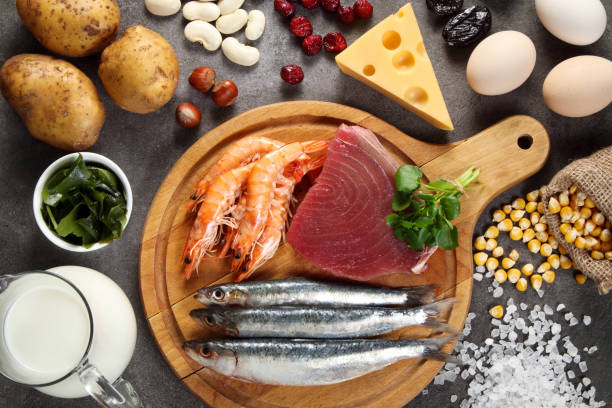By Deborah Bamisaye
“What’s this?”
“Salt.”
“Salt? But it looks like tiny, almost crystal-clear stones. How much?”
“(Laughs) That’s no ordinary salt, ma! This is the real deal — pure, organic iodine salt. It costs N3,000.”
“N3,000?! Are you kidding? I just bought a whole sachet of salt for N200!”
“That N200 salt is just the regular salt. If you care about your mental sharpness and thyroid health, you’ll want this one. You see, Iodine controls your metabolism, heart rate and even your baby’s brain.”
“Really? How do you know this? But it sounds expensive but important…”
“Google it! Once you know what iodine does, you’ll never settle for cheap salt again.”
“Hmm… I’ll check it out. Just a minute please…Wow!!!”
“Give me one please!”
IODINE:
Iodine is a non-metallic solid at room temperature and is the heaviest stable halogen. Iodine is essential for life as it plays a critical biological role in the synthesis of thyroid hormones, mainly tetraiodothyronine (T4) and triiodothyronine (T3).
We need iodine because it is required by the thyroid gland to produce thyroid hormones, which regulate key bodily functions such as metabolism, growth, energy use, brain, and bone development. Thyroid hormones are especially important during pregnancy and early childhood for healthy brain and nervous system development. Without adequate iodine, the thyroid cannot produce enough hormones, potentially leading to an enlarged thyroid gland (goitre) and intellectual disabilities in severe cases.
Iodine is naturally found in various foods, especially seafood, seaweed, dairy products, eggs, and iodized salt. Since iodine is not produced by the human body, it must be obtained through diet or supplements as needed.
This essential nutrient is a key component for overall health, especially for pregnant women and young children.
We will mention a few professionals who have provided leadership, expertise, and advocacy to advance Nigeria’s progress in eliminating iodine deficiency disorders, primarily by championing universal salt iodization and nutrition monitoring.
Professor Eyitayo Lambo (Former Minister of Health, Nigeria)
– Praised the Universal Salt Iodization (USI) programme, saying it “protected virtually all Nigeria’s newborns against the mental impairment arising from absence of iodine” in the diet.
Dr. Francis Aminu (Micronutrient Initiative/Iodine Expert)
– Recognized by UNICEF as a core member of Nigeria’s national expert committee on USI.
– His work included helping assess iodine levels in salt and implementing improved strategies for monitoring and public awareness in collaboration with regulatory bodies like NAFDAC and SON.
Dr. Isiaka Stevens Alo (UNICEF, Micronutrient Specialist)
– Acknowledged as a critical UNICEF Project Officer in Nutrition. He worked on fostering the institutionalization of the IDD/USI taskforce, which coordinated quarterly monitoring of iodine levels in edible salt and consumer awareness campaigns. He played a leading role in evaluating the progress and challenges of the national USI programme. Now, let us consider iodine needs for the unborn babies.
Risks of Iodine Deficiency in Pregnancy:
Iodine deficiency during pregnancy carries significant risks for both the mother and the foetus. These risks include:
- Increased risk of miscarriage, stillbirth, and preterm labour.
- Development of goitre and thyroid nodules in the mother due to increased thyroid stimulation.
- Maternal hypothyroidism which can impair normal thyroid hormone production needed during pregnancy.
- Impaired foetal neurodevelopment leading to cognitive deficits, intellectual disability, and cretinism (severe mental and physical developmental delays).
- Increased risk of foetal growth restriction, resulting in low birth weight and small for gestational age babies.
- Possible increased risk of pregnancy complications such as gestational hypertension, pre-eclampsia, placental abruption, and gestational diabetes.
- Long-term effects on the child’s abilities, including lower IQ, speech difficulties, and poor school performance.
Early iodine supplementation can help prevent many of these adverse outcomes, but severe iodine deficiency especially poses risks of irreversible brain damage and developmental delays in the child.
With that said, how should they go about taking it?
Iodine Supplement Guidelines for Pregnant Women
For pregnant women, the general iodine supplement guidelines are:
- The World Health Organization (WHO), American Thyroid Association, and other health authorities recommend a daily iodine intake of 220 to 250 micrograms during pregnancy to support foetal brain and nervous system development.
- A typical supplement dose is 150 micrograms of iodine per day in addition to dietary sources.
- Pregnant women are advised to take a daily iodine-only supplement or a prenatal vitamin containing iodine (usually potassium iodide).
- Supplementation should ideally begin before conception and continue throughout pregnancy and breastfeeding.
- Women with pre-existing thyroid conditions should consult their healthcare provider before supplementing.
- In iodine-deficient regions, supplementation alone may sometimes be insufficient, so additional public health measures (like iodized salt) are also important.
In summary, taking a daily supplement of about 150 mcg iodine along with iodine-rich foods is the standard guideline for pregnant women to achieve the recommended total intake of around 220-250 mcg/day.
Confused? Let’s Consider a Teaspoon Measurement:
The appropriate daily amount of iodized salt to meet iodine intake needs for adults is about 1/2 to 3/4 of a teaspoon. This amount provides the recommended 150 micrograms of iodine daily for most adults.
More specifically:
– To get the recommended 150 micrograms of iodine, consuming approximately 1/2 (half) to 3/4 (third quarter) teaspoon of iodized salt daily is sufficient.
– Pregnant and breastfeeding women need higher iodine intake (220 to 290 micrograms), so their iodized salt consumption may be slightly more or supplemented accordingly.
Considering bioavailability, about 1.5 to 2 teaspoons may be needed from iodized salt alone. It is important that pregnant women do not rely solely on iodized salt but also consider supplements if advised by healthcare providers.
Also, it is advised not to exceed 4 teaspoons of iodized salt daily to avoid excessive iodine and sodium intake, which can be harmful.
In other words, a practical daily measure of iodized salt is about 1/2 to 3/4 teaspoon to meet iodine requirements for an average adult. Excessive iodine intake should be avoided for thyroid health reasons.
When iodine catcalls, the body signals. How then do we decipher the hidden language of our health? Let’s uncover more in the next edition. See you soon!





